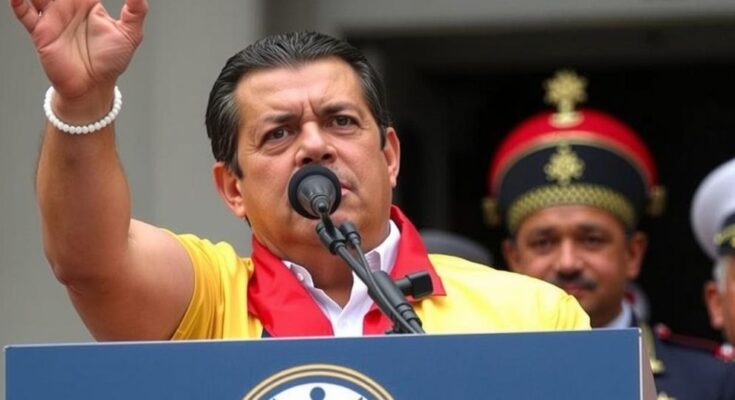Venezuelan President Nicolás Maduro was sworn in for a contentious third term despite credible allegations of election fraud favoring opponent Edmundo González. Protests erupted as opposition leader María Corina Machado faced detention while advocating for González. International leaders condemned the government’s actions, while allegations of electoral malpractice led to significant unrest in the country, resulting in many arrests and fatalities.
In a controversial ceremony on Friday, Venezuelan President Nicolás Maduro was sworn in for a third six-year term, extending his government until 2031, despite credible allegations that his opponent, Edmundo González, won the recent presidential election. The event took place at Venezuela’s legislative palace amid heavy police presence, while protests erupted in Caracas as opposition groups demanded recognition of González as the legitimate president. Demonstrators accused the government of electoral fraud and suppressing dissent through intimidation and violence.
The opposition, led by María Corina Machado, rallied significant public support against Maduro, although Machado herself was reportedly detained by security forces during protests advocating for González’s swearing-in. Her subsequent statement from a safety location condemned the government’s actions, reflecting a broader discontent among Venezuelans regarding the electoral process. Global leaders, including U.S. President-elect Donald Trump, voiced their support for the opposition leaders, emphasizing the need for safety and freedom for dissenters amid rising tensions.
Allegations of electoral fraud have plagued Maduro’s administration, particularly after the National Electoral Council failed to provide detailed vote counts, unlike in previous elections. The opposition claimed to have collected substantial evidence of vote tallies indicating González’s victory. The U.S.-based Carter Center corroborated their findings, affirming the legitimacy of the opposition’s numbers, leading to widespread national protests and international condemnation. Conditions deteriorated significantly following the election, with over 2,000 arrests and reports of violence against demonstrators, resulting in over 20 fatalities.
With no heads of state reportedly attending the inauguration and a continued threat against opposition figures like González, who remains in exile, the atmosphere remains charged and uncertain. The Venezuelan government’s abuse of power and control over information exacerbates the already fragile political landscape as many citizens continue to protest against what they deem as an illegitimate regime.
The political atmosphere in Venezuela remains tumultuous following the recent presidential elections, which are marred by allegations of fraud and government oppression. Nicolás Maduro’s extended presidency has been met with significant opposition, most notably from María Corina Machado and her supporters, who argue for the legitimacy of their chosen candidate, Edmundo González. The broader context includes a history of controversial elections where key opposition parties were restricted from participating, casting doubts on the fairness of the electoral process. International scrutiny has increased, as leaders across the globe condemn the government’s actions, demanding transparency and respect for human rights.
In conclusion, Nicolás Maduro’s inauguration amid widespread allegations of electoral fraud and repression highlights the ongoing political crisis within Venezuela. Despite international condemnation and increasing dissent from opposition groups, Maduro’s regime continues to exert its control, leading to a turbulent environment where dissent is met with violence and intimidation. The future of Venezuelan democracy remains precarious, with citizens rallying for change amid threats against their leaders.
Original Source: wsvn.com




